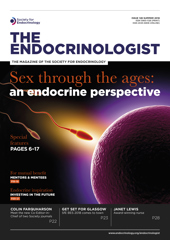‘Nursing practice’ is one of the categories for abstracts submitted to the Society for Endocrinology BES conference 2018, and all nurses are encouraged to submit at www.endocrinology.org/sfebes2018. The deadline for submission is 25 June. Accepted abstracts are presented at the event as a poster, e-poster, or as an oral presentation, and will also be published online in Endocrine Abstracts.
Please contact [email protected] for further information or support (including examples of previous nursing abstracts and posters). Advice on writing abstracts was given at the recent Endocrine Nurse Update and is also included on these pages, as attendees said they found it useful.
HOW TO WRITE A SCIENTIFIC ABSTRACT
An abstract might relate to a conference poster or an oral presentation. Its aim is to provide the reader with a brief summary, outlining a piece of work undertaken or in progress. The poster or presentation will then offer much more detail for those who are interested in knowing more.
Divide your abstract into the following sections:
- Introduction (one to two sentences)
(a) Why was the work done?
(b) What was the aim of the work?
- Methods
(a) How were data gathered?
(b) Include information about sample size, data collection methods, etc.
- Results
(a) What did the study find out?
(b) Did this match the original theory?
- Discussion (one to two sentences)
(a) How does the outcome affect service delivery/development?
(b) Will it be repeated to review service changes? It is important to stick to the word limit provided and ensure authorships are annotated according to guidelines provided by the event organisers.
HOW TO APPLY FOR: THE SOCIETY’S ENDOCRINE NURSE GRANT
SUMMARY OF COSTS
You need to provide a breakdown of how you plan to spend the awarded money, including a short explanation of why you need each item.
JUSTIFICATION FOR FUNDING
So that the marking panel can understand the motivations behind the project, a justification for the grant is needed. The justification should include some consideration of three broad areas:
- the benefit to the applicant
- the benefit to the endocrine practice and community
- how findings will be shared.
- Benefit to applicant
The Society aims to support all its members to achieve their potential, so it is important to include information on the personal benefit the grant could bring. This should include what your professional goals are, and how undertaking the funded project will help you in progressing towards these goals.
Examples:
Taking on a leadership role at some point in the future
Leading an audit can allow you to prove you can identify problems, propose solutions, identify their suitability and evaluate the outcomes
Apply for a PhD
Having preliminary data as part of your PhD application can increase the chance of success
The skills you learn undertaking a short research project will be applicable to your PhD
Increasing specialisation in an endocrine area
- Benefit to endocrine research/nursing/clinical practice
Your project will offer some benefit to the wider endocrine community. It is important to explain why these benefits matter, and how your funded project will provide improvements. Identifying what gave you the idea to undertake the project can be helpful here. While your project will offer benefit to endocrine practitioners, it should also improve the experience of patients and their carers. For some projects this impact may be direct and easy to identify, for others the impact may be more indirect.
Examples:
- Testing whether a new approach is cost-effective
- Helping to build a climate for nurses to become more autonomous
- Reducing pressure on consultant clinics
- Helping ensure continuity of care
- Quicker diagnosis or access to medication
- Ensuring safe and quality care for patients
- Reducing patient waiting times
- How findings will be shared
Even the greatest of projects will have little impact if the findings/ learning are never shared. It is important to consider how you hope to share your findings after completing your project.
Examples:
- Publishing a paper in a peer reviewed journal such as Endocrine Connections
- Presenting a poster or talk at a conference such as SfE BES or RCN
- Sharing your findings at Endocrine Nurse Update
- Making use of communication channels within your institution
EXAMPLES OF REAL PROJECTS
Outcome of patients with Graves’ disease after long-term follow-up
Audit of the outcome/relapse rate and possible predictive factors of recurrence in a series of patients with Graves’ disease managed in a nurse-led thyroid clinic. To achieve this, notes were reviewed for 60 patients with newly diagnosed Graves’ disease seen in the clinic between 2005 and 2011 and who had completed 18 months of anti-thyroid drug treatment.
www.endocrine-abstracts.org/ea/0028/ea0028p157.htm
A thyroid nurse-led service: patients’ perspective: an audit
A thyroid, nurse-led clinic (NLC) was set up in the Department of Endocrinology in Oxford primarily to reduce waiting times of patients with uncomplicated thyrotoxicosis from 3–4 months to 2–4 weeks. An audit explored the patients’ perspective on the provision of care and the service delivery. A structured questionnaire was created to perform the audit: 22 questions examined patients’ views on care and management, nurse’s knowledge and skills, efficiency of the service, and possible concerns. This was posted to the first 40 patients, who had been seen in the thyroid NLC. All data were collected anonymously. Thirty questionnaires were returned over 4 weeks. This gave a valuable insight into understanding patients and the success of the service.
www.endocrine-abstracts.org/ea/0019/ea0019p392.htm
There are two application deadlines for the Endocrine Nurse Grant per year, the next is on Wednesday 28 November. More details are available at www.endocrinology.org/grants-and-awards.






